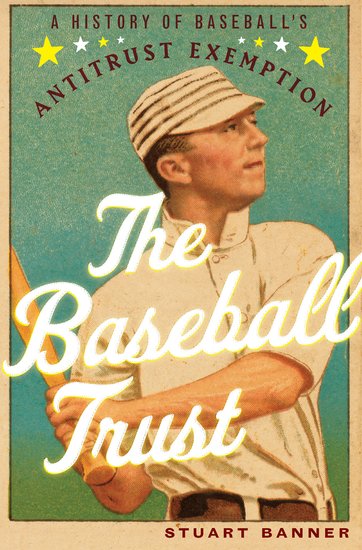By Stuart Banner
As the baseball season opens and fans wonder how their favorite teams and players will do this year, a certain sort of fan will also wonder about a perennial question. Why is baseball the only sport exempt from antitrust law?
The answer cannot be found in the text of the antitrust statutes, which do not distinguish between baseball and other forms of enterprise. Nor can it be found in the economic structure of the baseball business, which is identical to that of the other major professional team sports. Applying antitrust law to sports can raise some difficult questions, but they are the same questions in baseball as in other sports. There is no reason to treat an agreement to restrict the location of baseball teams, for example, differently from an agreement to restrict the location of football teams. The antitrust concerns implicated by a draft of baseball players are the same as those implicated by a draft of basketball players. So how did baseball become the only sport exempt from the antitrust laws?

The exemption’s origin is a 1922 Supreme Court case called Federal Baseball Club of Baltimore v. National League, in which the Court held that the federal antitrust laws did not apply to baseball, because these laws only governed interstate commerce, and baseball was not a form of interstate commerce. The issue returned to the Supreme Court in 1953 and 1972, and both times the Court declined to overrule Federal Baseball Club, even though the conventional professional understanding of interstate commerce had expanded dramatically in the interim. Meanwhile, in two cases from the 1950s, one involving boxing and the other football, the Court made clear that the exemption is only for baseball, not for sports generally. Congress has had the power, all the while, to amend the antitrust laws to treat sports equally, but it has done so only to a very limited extent. The outcome of this combination of activity and inactivity is an exemption just for baseball, one that is now nearly a century old.
How can we explain the persistence of such a weird state of affairs? The most common explanation emphasizes the unique position of baseball in American culture. Judges and legislators have bent over backwards, the argument goes, to protect the national pastime.
But while baseball no doubt has a meaning in American culture unlike that of other sports, and while one can certainly find examples of judges and politicians proclaiming their love for baseball, there is much more to baseball’s exemption than the desire of government officials to express their passion for the game by insulating it from lawsuits. It is a story in which a sophisticated business organization has been able to work the levers of the legal system to achieve a result favored by almost no one else. For all the well-known foibles of the owners of major league baseball teams, baseball has consistently received and followed smart antitrust advice from sharp lawyers, all the way back to the 1910s, when the sport faced its first antitrust crisis.
At the same time, it is a story that serves as an arresting reminder of the path-dependent nature of the legal system. At each step, judges and legislators made decisions that were perfectly sensible when considered one at a time, but this series of decisions yielded an outcome that makes no sense at all.
Stuart Banner is the Norman Abrams Professor of Law at UCLA. His latest book, The Baseball Trust: A History of Baseball’s Antitrust Exemption (2013), has just been published by Oxford University Press.
Subscribe to the OUPblog via email or RSS.
Subscribe to only law and politics articles on the OUPblog via email or RSS.



[…] was exempted from federal antitrust law because the sport was not considered “interstate commerce” in the 1920s when the Supreme Court first decided the issue. Today, however, the Court regards […]
They constantly innovate and upgrade the bats they make and the best example can be found in the 2009 series of bats.
[…] had an exemption from federal Antitrust laws. Why? A decent argument could simply be central position baseball occupied in American culture. Judges knew what baseball meant, so they kept finding ways to ‘protect’ […]